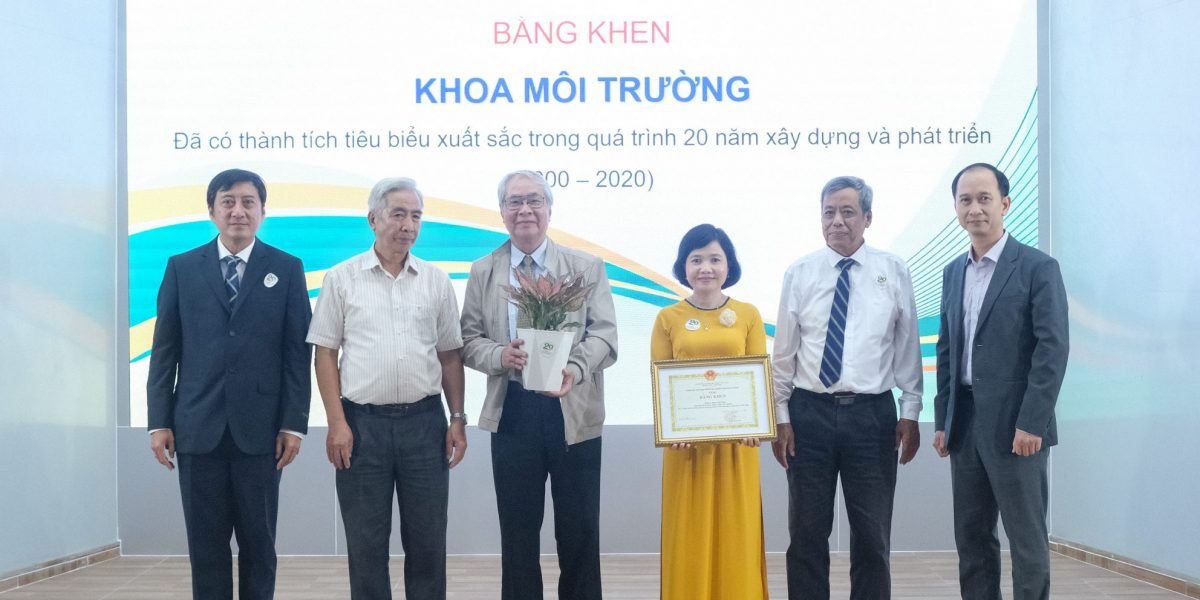
To address the environmental challenges arising from national socioeconomic development, on January 18, 2000, the Chancellor of the Vietnam National University issued Decision No. 14/QD/DHQN/TCCB on establishing the Faculty of Environment at the VNUHCM-University of Science. Associate Professor Dr. Vu Chi Hieu was appointed to organize and lead this new unit. The establishment of the Faculty of Environment marked a significant milestone in providing a qualified workforce in environmental fields whose expertise aligns with the global trend. It also represented a significant step in diversifying the range of educational programs in the VNUHCM-University of Science, which is one of Vietnam’s lead institutions in basic sciences education and research.
During its inception, the Faculty of Environment at VNUHCM-University of Science drew its staff from existing faculties such as Geology, Biology, and Chemistry, in addition to exceptional graduates with bachelor’s degrees in related environmental fields. Over the past two decades, the faculty’s staff has grown significantly in both quality and quantity. As of January 2023, the Faculty of Environment boasts 50 members, including 4 Associate Professors, 18 Doctorate degree holders, 27 Masters degree holders, and 1 Bachelor’s degree holder, with 44% of the staff possessing Ph.D. degrees. This highly qualified group of lecturers and researchers, having been trained at prestigious educational institutions both domestically and internationally, forms a solid foundation for the faculty’s educational and research endeavors.
The Faculty of Environment at VNUHCM-University of Science offers a comprehensive range of educational programs, encompassing four undergraduate and four postgraduate degrees. At the undergraduate level, the faculty provides four distinct bachelor’s programs: Environmental Science (introduced in 2000), Environmental Engineering Technology (launched in 2007), a high-quality Environmental Science (initiated in 2020), and Natural Resources and Environmental Management (established in 2022). To date, the faculty has successfully trained nearly 2,400 bachelor’s in environmental science and 1,100 bachelors in Environmental Engineering Technology. At the postgraduate level, the faculty oversees two Master programs: Environmental Science (offered since 2001) and Natural Resources and Environmental Management (available since 2004). Additionally, the faculty has two PhD programs: Soil and Water Environment (admitting students since 2006) and Natural Resources and Environmental Management (enrolling students since 2007). The faculty’s annual enrollment at the undergraduate level stands at approximately 350 students, while the postgraduate programs welcome approximately 40 master students and 6 doctoral students each year.
In addition to their teaching responsibilities, the Faculty of Environment’s staff has actively engaged in scientific research that has made substantial contributions to addressing critical environmental challenges such as water and air pollution, climate change, sustainable resource utilization, and the development of environmentally friendly materials. Between 2015 and 2020, the faculty’s research efforts yielded an output of approximately 350 scientific publications, including 85 articles in international journals indexed on the SCI-E list. Additionally, the faculty has successfully conducted 62 scientific research projects at various levels. These achievements have made significant contributions to the overall enhancement of quality in both teaching and scientific research.
External collaboration efforts play a pivotal role in the faculty’s development, receiving substantial attention. The faculty also actively fosters alumni engagement. These efforts have been expanded in recent years to encompass diverse partnerships in research, training, lecturing, and student and staff exchange programs. Collaboration with alumni, businesses, and partners to develop and implement training programs is ongoing. The faculty has established cooperation agreements or memoranda of understanding with over eight domestic institutions and businesses and has formed collaborative partnerships with schools and institutes in various countries worldwide, including Taiwan, Japan, Korea, Hungary, the United Kingdom, the United States, and others.
With over two decades of establishment and development, the Faculty of Environment has affirmed its position and reputation in the realm of scientific, technological, and environmental management training and research in Vietnam, particularly in the southern region. Moving forward, the faculty will continue its trajectory of growth, aiming to further enhance and solidify its position. Its role will increasingly emphasize the integration of training and research with technology transfer within the field of natural resources and environmental management, fostering a seamless connection with social practices. Additionally, the faculty will prioritize strengthening collaborative endeavors in training and research with strategic partners both domestically and internationally.

